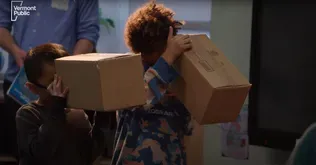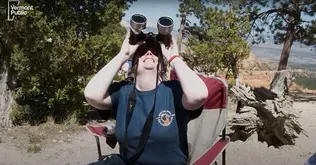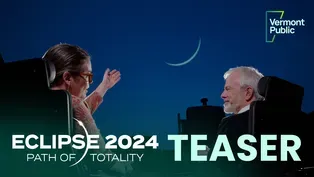Vermont Public Specials
The science behind solar eclipses
Clip: Season 2024 Episode 3 | 4m 25s
Astronomer Mark Breen answers common questions about solar eclipses.
Astronomer Mark Breen, director of the planetarium at the Fairbanks Museum in St. Johnsbury, Vermont, answers common questions about solar eclipses like the one we'll see on April 8, 2024. Why isn't there an eclipse every time the moon orbits the earth? How often can an eclipse pass one location? How does an eclipse change when the moon is closer to or farther from the earth?
Vermont Public Specials is a local public television program presented by Vermont Public
Vermont Public Specials
The science behind solar eclipses
Clip: Season 2024 Episode 3 | 4m 25s
Astronomer Mark Breen, director of the planetarium at the Fairbanks Museum in St. Johnsbury, Vermont, answers common questions about solar eclipses like the one we'll see on April 8, 2024. Why isn't there an eclipse every time the moon orbits the earth? How often can an eclipse pass one location? How does an eclipse change when the moon is closer to or farther from the earth?
How to Watch Vermont Public Specials
Vermont Public Specials is available to stream on pbs.org and the free PBS App, available on iPhone, Apple TV, Android TV, Android smartphones, Amazon Fire TV, Amazon Fire Tablet, Roku, Samsung Smart TV, and Vizio.
Providing Support for PBS.org
Learn Moreabout PBS online sponsorshipHow to make a pinhole viewer for the solar eclipse
One of the safest ways to view a total solar eclipse is by using a pinhole viewer. (3m 5s)
PREVIEW: Solar Eclipse 2024: Path to Totality
Vermont Solar Eclipse 2024: Path to Totality," premieres Wednesday, March 27th. (2m 18s)
Providing Support for PBS.org
Learn Moreabout PBS online sponsorshipVermont Public Specials is a local public television program presented by Vermont Public














